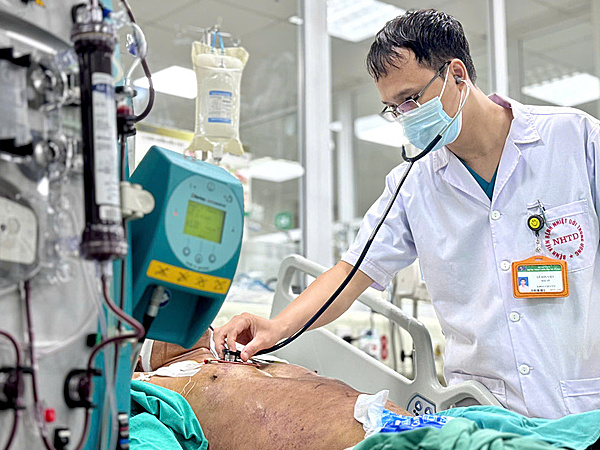On 3/7, a representative from the National Hospital for Tropical Diseases reported that the patient was found in a state of delirium, with purpura and bloody diarrhea, when his family forced their way into his room.
At the initial medical facility, doctors noted his blood pressure had dropped drastically to 60/40 mmHg, a sign of severe circulatory shock. Despite receiving fluids and vasopressors to raise his blood pressure, the patient did not respond.
Doctors diagnosed him with septic shock, a condition where insufficient blood flow prevents vital organs like the brain, heart, liver, and kidneys from functioning properly. This can lead to multiple organ failure and death if not treated promptly. The patient was urgently transferred to the National Hospital for Tropical Diseases. The medical team implemented intensive care measures, including blood filtration and mechanical ventilation, closely monitoring his hemodynamic and coagulation parameters.
Doctor Le Son Viet from the Emergency Department reported that in addition to severely low blood pressure, the patient also suffered from severe coagulopathy with bleeding from multiple sites, including his nose, mouth, stomach, and under the skin. Notably, necrotizing fasciitis, characterized by areas of darkened, swollen, and painful skin caused by streptococcus suis bacteria directly attacking blood vessels and causing tissue death, has appeared. The necrotizing fasciitis is spreading across his limbs, accompanied by subcutaneous bleeding, increasing the risk of extensive necrosis, sepsis, and multiple organ failure. His prognosis is very guarded.
Doctors are currently awaiting blood culture results to determine the exact cause of the illness.
 |
Doctors treating the patient. Photo: Hospital provided |
Streptococcus suis is a bacterium that can cause severe infections, typically starting within 24-72 hours after entering the body. Just one day after initial symptoms like fever, abdominal pain, and diarrhea appear, the disease can rapidly progress to septic shock, necrosis, and multiple organ failure.
For prevention, people should only consume meat from reputable sources that has passed inspection. It is crucial to avoid pig's blood pudding and any undercooked pork products. If any unusual symptoms like fever, headache, nausea, or diarrhea occur after eating pork, seek immediate medical attention for examination and timely treatment.
Thuy Quynh












